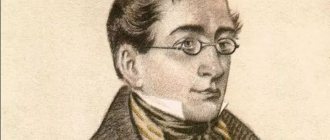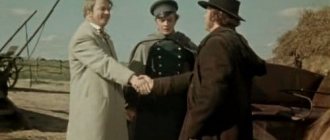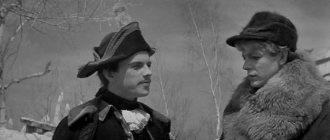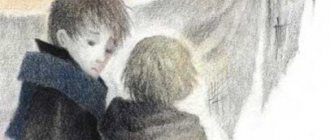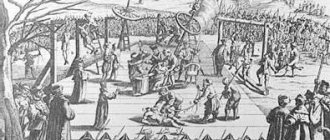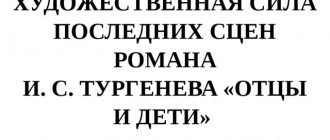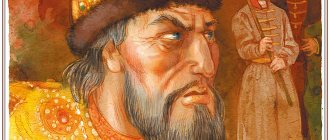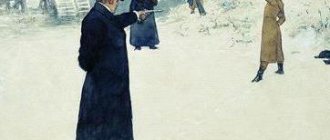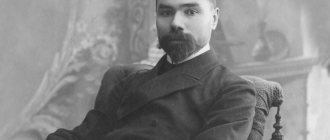Essay on the topic: “Relationships between Grinev and Shvabrin”
Alexey Ivanovich Shvabrin is not only a negative character, but also the opposite of Pyotr Andreevich Grinev, the narrator on whose behalf the narration in “The Captain's Daughter” is told.
Grinev and Shvabrin are not the only characters in the story who are in one way or another compared to each other: similar “pairs” are formed by almost all the main characters of the work: Empress Catherine - false emperor Pugachev, Masha Mironova - her mother Vasilisa Egorovna - which allows us to say about comparison as one of the most important compositional techniques used by the author in the story.
It is interesting, however, that not all of the named heroes are absolutely opposed to each other. Thus, Masha Mironova, rather, is compared with her mother and displays as much devotion to her chosen one and courage in the fight for him as captain Mironova, who was not afraid of the villains and accepted death with her husband. The contrast between the “couple” Ekaterina and Pugachev is not as clear as it seems at first glance.
These hostile and warring characters have many similar traits and similar actions. Both are capable of cruelty and of showing mercy and justice. In the name of Catherine, supporters of Pugachev (a mutilated Bashkir with his tongue cut out) are brutally persecuted and brutally tortured, and Pugachev commits atrocities and executions together with his comrades. On the other hand, both Pugachev and Ekaterina show mercy towards Grinev, saving him and Marya Ivanovna from trouble and ultimately arranging their happiness.
And only between Grinev and Shvabrin nothing but antagonism is revealed. It is already indicated in the names with which the author calls his heroes. Grinev bears the name Peter, he is the namesake of the great emperor, for whom Pushkin, of course, had the most enthusiastic feelings. Shvabrin is given the name of the traitor to his father's cause - Tsarevich Alexei. This, of course, does not mean at all that every character in Pushkin’s work who bears one of these names should be correlated in the reader’s mind with the named historical figures. But in the context of the story, where the problem of honor and dishonor, devotion and betrayal is so important, such a coincidence seems no coincidence.
It is known how seriously Pushkin took the concept of family noble honor, what is commonly called roots. It is no coincidence, of course, that this is why the story tells in such detail and detail about the childhood of Petrusha Grinev, about his family, in which the traditions of centuries-old noble upbringing are sacredly preserved. And even though these “habits of dear old times” are described not without irony, it is obvious that the author’s irony is full of warmth and understanding. And in the end, it was the thought of the impossibility of disgracing the honor of the clan and family that did not allow Grinev to commit betrayal against his beloved girl and violate the officer’s oath.
Shvabrin is a man without a family, without a tribe. We know nothing about his origin, about his parents. Nothing is said about his childhood or upbringing. Behind him, it seems, there is no spiritual and moral baggage that supports Grinev. Apparently, no one gave Shvabrin the simple and wise instruction: “Take care of your honor from a young age.” And therefore he easily neglects it to save his own life and simply for his personal well-being. At the same time, we note that Shvabrin is an avid duelist: it is known that he was transferred to the Belogorsk fortress for some kind of “villainy,” probably for a duel. He challenges Grinev to a duel, and in a situation where he himself is entirely to blame: he insulted Maria Ivanovna, vilely slandering her in front of the lover Pyotr Andreevich.
It is important that none of the honest heroes approve of duels in the story: neither Captain Mironov, who reminded Grinev that “duels are formally prohibited in the military article,” nor Vasilisa Yegorovna, who considered them “murder” and “murder,” nor Savelich. Grinev accepts the challenge, defending the honor of his beloved girl, while Shvabrin - from the fact that he was rightly called a liar and a scoundrel. Thus, in his addiction to duels, Shvabrin turns out to be a defender of superficial, falsely understood honor, a zealot not for the spirit, but for the letter of the law, only for its external observance. This once again proves that he has no idea of true honor.
For Shvabrin, nothing is sacred at all: no love, no friendship, no duty. Moreover, we understand that neglecting these concepts is commonplace for him. From the words of Vasilisa Yegorovna, we learn that Shvabrin “does not believe in God,” that he was “discharged from the guard for murder.” Not every duel and not every officer was dismissed from the guard. Obviously, some ugly, vile story was connected with that duel. And, therefore, what happened in the Belogorsk fortress and subsequently was not an accident, not a consequence of momentary weakness, not just cowardice, which is ultimately excusable under certain circumstances. Shvabrin came to his final fall naturally.
He lived without faith, without moral ideals. He himself was incapable of love, and neglected the feelings of others. After all, he knew that he was disgusted with Masha, but, despite this, he harassed her, stopping at nothing. The advice he gives to Grinev regarding Marya Ivanovna reveals him as a vulgar (“... if you want Masha Mironova to come to you at dusk, then instead of tender poems, give her a pair of earrings”), Shvabrin is not only mean, but also cunning. After the duel, fearing new troubles, he acts out a scene of sincere repentance in front of Grinev. Subsequent events show that the simple-minded Grinev was in vain to believe the liar. At the first opportunity, Shvabrin takes vile revenge on Grinev by betraying Marya Ivanovna to Pugacheva. And here the villain and criminal, the peasant Pugachev, shows a nobility incomprehensible to Shvabrin: he, to Shvabrin’s indescribable anger, lets Grinev and Masha Mironova go with God, forcing Shvabrin to give them “a pass to all outposts and fortresses under his control. Shvabrin, completely destroyed, stood dumbfounded”...
The last time we see Shvabrin is when he, arrested for his connection with Pugachev, shackled in chains, makes a last attempt to slander and destroy Grinev. He had changed greatly in appearance: “his hair, recently black as pitch, had completely turned grey,” but his soul was still black: he pronounced his accusations, albeit in a “weak but bold voice” - so great was his anger and hatred of his opponent’s happiness.
Shvabrin will end his life as ingloriously as he lived: loved by no one and loved by no one, serving no one and nothing, but only adapting all his life. He was like a tumbleweed, a plant without a root, a man without a clan, without a tribe, he did not live, but rolled down until he fell into the abyss...
Source: biblioman.org
Essay: Grinev and Shvabrin in the story “The Captain’s Daughter” (A.S. Pushkin)
(606 words) The famous story by Alexander Sergeevich Pushkin “The Captain's Daughter” tells about a significant event for Russia - the Pugachev uprising. This work covers a very large period of time, it depicts many heroes. This is one of those books that you can re-read several times and always discover something new. After all, in the story the author raised very important and relevant topics. Thus, it tells the story of how a young man turns from a youth into a man, having gone through many life trials and difficulties. To show his hero in all his glory, the author creates his antipode. A comparison of the two main characters of Pushkin's story - Grinev and Shvabrin - helps to better understand the content of the book and the author's intention.
While describing historical events, the writer simultaneously contrasts the moral principles of the main characters. So, in the center of the story are two officers Grinev and Shvabrin. These are heroes of absolutely opposite views and characters. The characters ended up serving in a remote fortress for completely different reasons. Grinev was sent to serve by his strict father, and Shvabrin was transferred to the fortress as punishment for murder in a duel. The age difference is also obvious: Shvabrin is about 25 years old, and Grinev is only 17.
At first, it may seem that these characters have many common features. So, they are both nobles by birth, both heroes are educated, and they also adore literature and poetry. They are also united by the fact that they are both not indifferent to Marya Mironova. But the attitude towards Masha Mironova reflects not the similarity, but the difference in the characters of the main characters. Shvabrin does everything to prevent Masha and Grinev from being together when he receives a refusal from the heroine. But Peter is more robotic in his feelings and does not dare to directly contact the girl. Alexey does not put up with refusal: he laughs at Grinev’s poems and speaks insultingly about his chosen one in order to destroy their union. Peter does not stoop to such tricks and does not believe his offender, because his opinion of Marya is exalted and respectful. Shvabrin provokes a duel, trying to kill his opponent. In response, Grinev risks his life to defend the honor of his beloved. As we see, the motives of the young people differ: one goes into a duel for the sake of love and honor, the other tries to dishonor the girl and get his opponent out of the way. At any cost.
During the duel, Shvabrin also shows his most humiliating qualities. When Peter turns to Savelich’s shout, Shvabrin stabs Grinev in the back. How will Peter respond to such meanness? Will he really take revenge? No! When Grinev recovers, he shows leniency towards Shvabrin and forgives him.
The main characters also have completely different ideas about the concept of officer honor and duty. So, for example, when the fortress is captured, Shvabrin betrays his oath and goes over to the side of the rebels. The reader sees how the hero fawns over Pugachev and begs for his forgiveness. Peter has a very difficult choice: he must either die or swear allegiance to Pugachev. For Grinev, honor and dignity are above all, and betrayal for him is tantamount to death. Grinev proudly answers Pugachev's questions and refuses to kiss his hand. And Pugachev suddenly recognizes Grinev as the master from whom he received the hare sheepskin coat. Subsequently, Pugachev repeatedly helped Grinev, respecting his honor and nobility.
In the scene of Maria's liberation from the fortress, Grinev's courage and courage are revealed, as well as Shvabrin's meanness, cowardice and weakness. Alexei threatens the heroine to marry him. But he is not able to change even the will of a young girl. And Grinev, risking his life, goes to help his beloved and wins.
In the finale, both characters find themselves before the tribunal: Alexey slandered Peter for the last time. But Grinev was saved by Marya’s intercession. Shvabrin miscalculated, because there was no one to defend him.
Thus, the writer, using the example of two characters, demonstrates the doom of those people who have lost honor and dignity, as well as the bright future of those who managed to preserve true human virtues. For Pyotr Grinev, there is nothing more important than honor and dignity. And the greedy and cynical Shvabrin lives by the laws of meanness and deception. In the image of Pyotr Grinev, the author embodied the best traits of the young nobleman, and in the image of Shvabrin - the worst.
Author: Victoria Komarova
Option 2 (details)
(1103 words) A. S. Pushkin’s novel “The Captain’s Daughter” laid the foundation for the historical novel. This work made a huge contribution to the development of Russian literature. Particular attention is drawn to the image of the main character Pyotr Grinev.
Pyotr Grinev performs two important functions in the novel. He is a storyteller, telling about his youth, drawn into the cycle of historical events. At the same time, Grinev is the main character of the novel “The Captain's Daughter”.
Childhood and origins
Pyotr Grinev belongs to the representatives of the Russian provincial nobility of the second half of the 18th century. He spent his childhood on the estate of his father, a landowner in the Simbirsk province. Uncle Savelich, a serf, was involved in raising little Peter. Then, as soon as Grinev mastered reading and writing, he came under the supervision of the Frenchman Beaupré, who turned out to be a drunkard and a libertine.
With some irony, Pyotr Grinev recalls his student years:
“I lived as a teenager, chasing pigeons and playing leapfrog with the yard boys.”
It is not at all surprising that Grinev was a very curious and calm child as a child. Indeed, later, having entered the service, he began to read French books, write poetry and even try his hand at poetry.
Family life and education
His father, a retired prime minister and a man of high moral principles, had a great influence on the development of the moral qualities of Pyotr Grinev. The father gives the right instructions to Pyotr Grinev, escorting him to service:
“Serve faithfully to whom you pledge allegiance; do not ask for service, do not refuse service; Don’t chase your boss’s affection; take care of your dress again, and take care of your honor from a young age.”
Grinev carried these words throughout his entire life. Brought up in strictness, Peter was able to retain his best qualities. In addition, the hero was dearly loved by his mother. After all, he is her only surviving son.
Grinev's attitude towards other heroes
Peter respects his parents and obeys them. So, without protest or grumbling, he went to the Belogorsk fortress instead of the capital garrison. But as he grows up, the hero becomes more independent and learns to make decisions independent of his father’s opinion. When the parent did not approve of the candidacy of his bride (Marya was without a dowry), Peter did not agree with him and nevertheless sent Marya to his home as his bride. He went against the wishes of his parents to protect his love. But otherwise he was a dutiful son.
Grinev's attitude towards Masha Mironova was sublime and respectful. Risking his life, he defended the girl’s honor in a duel with Shvabrin. He dedicated poems to her and had serious feelings. Later he saves Marya more than once. More details about this in the following sections.
Grinev's attitude towards Shvabrin was at first friendly. Peter liked to communicate with a witty and caustic interlocutor. Alexey was a smart man, but unprincipled. Gradually, Peter notices that his slander towards the Mironovs goes beyond all boundaries. Because of his remark to Masha (allegedly she will visit Peter at night if she receives expensive earrings), Peter cannot stand it and enters into conflict. Both officers do not find seconds and fight, despite the commandant's ban. Shvabrin wounds the enemy with a sneaky blow to the back. In the future, Alexey stubbornly takes revenge on Peter, because Marya chooses him. He slandered his former friend in front of Pugachev so that he would be executed even without trial. Then he further falsely testifies in court and accuses Peter of aiding the rebels. Peter sincerely forgives him after the duel and is imbued with pity for him. Then he shows mercy, refusing revenge on the enemy.
Alexander Pushkin portrays Grinev as a positive character, but far from ideal. For example, at the very beginning he treats Savelich only as a servant. He reminds him of his low position: “...give me money here or I’ll drive you away,” “...you’re probably drunk, you’re going to bed...”. But at the same time, in the process of his formation, Grinev changes his attitude towards Savelich and learns to respect and thank him. Gradually, Peter becomes closer to him and even invites him to leave when he plans a risky foray into the enemy’s camp. In this episode, he himself shows concern for the servant.
Pyotr Grinev is not at all concerned about the situation of ordinary people. The hero does not think about the injustice of the serfdom. But he himself treats the poor without arrogance. So, when Pugachev helped him and Savelich get out of the snowstorm, Peter thanks him very generously - he gives him a sheepskin coat, despite Savelich’s protest. Grinev does this because Emelyan was dressed lightly and could freeze. This episode demonstrates the hero's responsiveness.
Grinev’s attitude towards Pugachev is respectful. This is not at all surprising, since Peter owes him a lot. Emelyan spared him twice and helped him save Marya. An understanding arises between them. At the same time, Peter honestly admits that he does not share his views on politics and will fight against the rebels, because he swore allegiance to the current government. Grinev does not fawn over Pugachev and does not intentionally seek his favor. It is open to him. He sympathizes with Pugachev's strong and strong-willed character, his wisdom and cunning. He sees that the rebel has put everything on the line, but clearly not from a good life.
Positive qualities of Peter Grinev
The main character of the work is characterized by such qualities as honor, nobility, kindness, honesty, loyalty to one’s convictions, and willpower. Peter is responsive to all people, often forgives insults and strives to make amends.
The antipode of Pyotr Grinev is Shvabrin. The only thing that unites these two heroes is origin and education. However, unlike Grinev, Shvabrin is selfish and vindictive. He considers completely normal actions: to humiliate a woman, to commit treason and betrayal.
Despite the fact that the heroes grew up in the same environment, their development as individuals occurred in different ways. This is explained by the different upbringings of the characters. It can be argued that Peter's parents are kind and decent people for whom moral laws are above all else. However, this cannot be said about Shvabrin’s parents. By this, Pushkin wanted to show that the development of personality depends, first of all, on upbringing in the family.
Test of love
In the Belogorsk fortress, life brings Pyotr Grinev together with the glorious family of Captain Mironov and the cowardly Shvabrin. The actions of the latter to a greater extent highlight the noble traits of the main character. Both fall in love with Masha Mironova, but if Shvabrin stoops to baseness after receiving a refusal, Grinev is ready to defend the honor of his beloved girl at the cost of his own life. This happens in the case of a duel, when the hero challenges a more experienced opponent to a duel, who spoke insultingly towards Masha. And also at the moment when the Pugachevites enter the fortress.
Shvabrin not only goes over to their side, but also tricks him into keeping the defenseless girl locked up, and then announces that she is the daughter of the executed commandant. The characterization of Pyotr Grinev is completely different in the current situation. He has to make a difficult choice between the duty of an officer, which obliges him to go to the unit, and the desire to protect his beloved. While the hero is sure that nothing threatens Masha, he goes to Orenburg, but at her first call, without receiving support and understanding from the command, he returns to the fortress. The hero will also remain silent at trial, when the accusation of treason based on the denunciation of the same Shvabrin could cost him his life. After all, to tell for what purpose he went to the fortress to Pugachev meant to involve the commandant’s daughter in an unpleasant story. And only Masha’s meeting with the empress will help restore justice and justify the hero.
Thus, the next stage when the formation of Pyotr Grinev’s personality occurs is his love, sincere and selfless. She turned yesterday's mischievous person into a noble person, capable of taking responsibility for another person.
